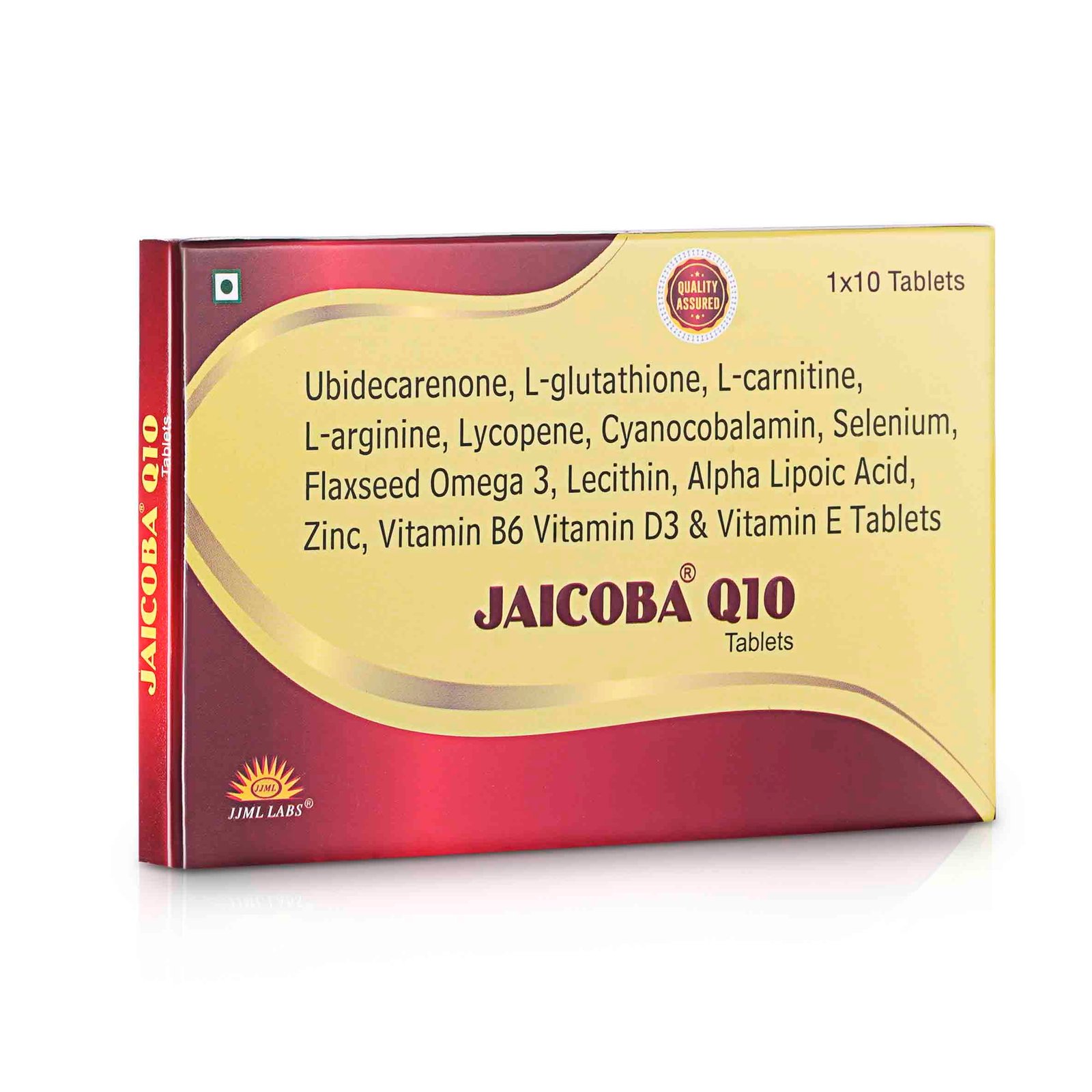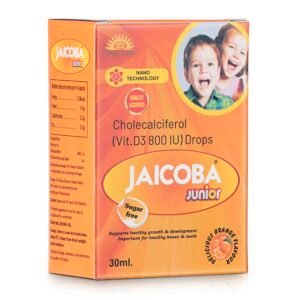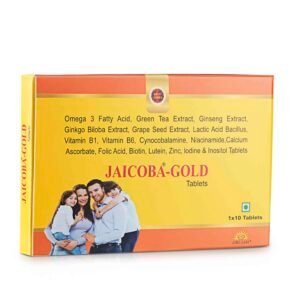JAICOBA Q10 – 100% Vegetarian Multivitamin Tablet
₹1,080.50
- Improve blood flow
- Heal wounds faster
- Alleviate anxiety
- Treat burns
- Improve kidney function for people with congestive heart failure
- Enhance exercise performance
9882 in stock
- Real Time 202 Visitor Right Now
-
Guarantee safe checkout

SHIPPING
- Complimentary ground shipping within 1 to 7 business days
- In-store collection available within 1 to 7 business days
- COD available
RETURNS AND EXCHANGES
- The genuine cases of damage, leakage, missing product(s), and wrong delivery of the product(s) will be taken into consideration.
- The customer shall bring the same to our notice within 7 working days from the date of receiving the product(s).
- All claims for shortages or damages must be reported to customer service at info@jjmllabs.com on the day of delivery.
Have a question?
Description
Jaicoba Q10 Tablet is a health supplement that leads to an improved overall sense of well-being. It helps the body cells produce energy, facilitates cell growth and promotes cardiovascular health. It is rich in antioxidants that protect the body from oxidative damage. Jaicoba Q10 is a 100% vegetarian tablet with exclusive combination of following ingredients:
Coenzyme Q10 is an essential chemical that the body produces naturally. A deficiency of this chemical can have adverse effects, and coenzyme Q10 supplements may offer health benefits.
-
CoQ10 is an antioxidant that the body produces naturally and stores in components of the cell called mitochondria. It has associations with energy, protecting cells, and providing heart benefits. CoQ10 plays a few critical roles in the body. For example, the body’s cells need this compound to produce the energy that allows them to function.
-
As an antioxidant, CoQ10 also protects the cells in the body by neutralizing free radicals, which reduces oxidative stress in the body. Oxidative stress can cause tissue damage, inflammation, and cellular apoptosis, or cell death. There are links between oxidative stress and a range of disorders, including Alzheimer’s disease and Parkinson’s disease.
-
Naturally occurring levels of CoQ10 decrease with age. Scientists have identified associations between CoQ10 deficiency and heart disease and cancer.
Health Benefits of CoQ10
CoQ10 has many varied uses. We discuss its possible benefits below.
Improving heart health
CoQ10 might help treat specific heart conditions, such as congestive heart failure and high blood pressure, particularly among older individuals. Research on the effectiveness of CoQ10 for heart problems has provided mixed results. However, one study reported that CoQ10 was an important factor in the survival of older adults with chronic heart failure. Other research Trusted Source showed that CoQ10 might help Trusted Source people recover from some types of heart surgery.
Reducing migraines
According to both the American Academy of Neurology and the American Headache Society, CoQ10 may be effective in preventing migraines, although the research to support this is still limited. It is possible that CoQ10 has this effect because it keeps the mitochondria in the cells healthy.
Easing statin side effects
Some research suggests that CoQ10 might help ease muscle weakness that is due to taking cholesterol-lowering medications, known as statins.
Glutathione is a powerful antioxidant found in every cell in the body. It is made of three types of molecules known as amino acids. Amino acids combine in different patterns to make all of the proteins in the body. One unique thing about glutathione is that the body is able to make it in the liver, which is not true of most antioxidants.
Glutathione has many important functions, including:
- Making DNA, the building blocks of proteins and cells
- Supporting immune function
- Forming sperm cells
- Breaking down some free radicals
- Helping certain enzymes function
- Regenerating vitamins C and E
- Transporting mercury out of the brain
- Helping the liver and gallbladder deal with fats
- Assisting regular cell death (a process known as apoptosis)
What are Benefits of Glutathione?
The benefits of glutathione may include:
1. Antioxidant Activity
Free radicals may contribute to aging and some diseases. Antioxidants help to counteract free radicals and protect the body from their damaging effects. Glutathione is a very strong antioxidant, partly because high concentrations can be found in every cell in the body.
2. Preventing Cancer Progression
Some research Trusted Source shows that glutathione has a role in preventing the progression of cancer. However, the same research indicates that glutathione may make tumours less sensitive to chemotherapy, which is a common cancer treatment.
3. Reducing Cell Damage in Liver Disease
Hepatitis, alcohol abuse, and fatty liver disease all damage the cells of the liver. A small 2017 clinical trial Trusted Source concludes that glutathione could help treat non-alcoholic fatty liver disease due to its antioxidant properties and potential to detoxify.
4. Improving Insulin Sensitivity
Insulin resistance can result in the development of type 2 diabetes. The production of insulin causes the body to move glucose (sugar) from the blood and into cells that use it for energy. A small 2018 study Trusted Source indicates that people with insulin resistance tend to have lower glutathione levels, particularly if they have experienced complications, such as neuropathy or retinopathy.
5. Reducing Symptoms of Parkinson’s Disease
According to some research Trusted Source, there is evidence that maintaining glutathione levels may help with the symptoms of Parkinson’s disease.
6. Reducing Ulcerative Colitis Damage
Like other inflammatory diseases, ulcerative colitis has been linked to oxidative damage and stress. A 2003 animal study Trusted Source suggests that glutathione supplementation can improve some of the damage to the colon in rats. Determining the effects of glutathione on ulcerative colitis will require more research in humans.
7. Treating Autism Spectrum Disorders
There is some evidence that children with autism have lower levels of glutathione than neurotypical children, or those without autism.
Alpha-lipoic acid is an organic compound in the body that acts as a potent antioxidant. It may have several health benefits. While the body produces alpha-lipoic acid (ALA) naturally, a person can boost their levels by making suitable dietary choices, taking supplements, or both. Supplementing with ALA is becoming increasingly popular, as some people believe that it may help with weight loss, diabetes, memory loss, skin health, and other health conditions.
ALA is present within mitochondria, which are the powerhouses of the cells. ALA is crucial for digestion, absorption, and the creation of energy. It helps enzymes turn nutrients into energy. It also has antioxidant properties Trusted Source. Since humans can only produce ALA in small amounts, many people turn to supplements to increase their intake.
Uses and Benefits
ALA may have an impact on the following:
Weight loss
Some claim that ALA may help people lose weight. For example, one study Trusted Source on an animal model found that ALA could improve skeletal muscle energy metabolism, possibly increasing how many calories the body can burn. However, studies also show that the impact of ALA on weight loss is small. According to a 2018 analysis Trusted Source, those taking ALA supplements only lost an average of 1.52 pounds and did not experience a significant change in their waist circumference.
Diabetes
Some research suggests Trusted Source that ALA may help the body control blood sugar levels and improve cholesterol levels. Research Trusted Source has also shown that it could reduce nerve damage symptoms that are common in people with diabetes, such as numbness, pain, and paralysis.
Inflammation
According to one 2018 analysis, ALA can significantly lower C-reactive protein (CRP) levels is an inflammation marker that may indicate chronic inflammation linked to harmful diseases such as diabetes and cancer.
Heart disease
According to some research Trusted Source, ALA, because it is a potent antioxidant, may help reduce oxidative stress. Oxidative stress is one of the primary causes of heart disease. A review of several randomized controlled trials Trusted Source also found that ALA could lower levels of “bad” cholesterol, another risk factor for heart disease.
Memory loss
Oxidative stress occurs naturally with age. As well as playing a role in the development of heart disease, it also plays a critical role in brain health and memory loss. According to a study Trusted Source in participants with Alzheimer’s disease, ALA may slow the progression of the condition. The researchers suggested that this might be due to ALA’s positive effects on insulin resistance and blood sugar metabolism, as diabetes is a risk factor for Alzheimer’s disease.
L-arginine is one of many amino acids the body needs to function properly. Like other amino acids, L-arginine plays a role in building protein. The body can use the protein to help build muscle and rebuild tissue. As a result, researchers have investigated the effectiveness of L-arginine in the treatment of severe wounds and tissue waste in serious illnesses.In addition to building protein, L-arginine releases nitric oxide in the blood. Nitric oxide acts to widen blood vessels in the blood stream, which may help aid certain circulatory conditions. A person’s body naturally produces L-arginine under normal circumstances. People also get additional L-arginine as part of their regular diet.
Benefits of L-arginine
L-arginine has two effects: it turns into nitric oxide and helps the body build protein.These effects give L-arginine an array of potential benefits that range from heart health and chest pain to helping to build muscles, repair wounds, and improve male fertility.
The following are some examples of researched benefits and uses of L-arginine:
- Growth hormone reserve test
- Reducing high blood pressure
- Correcting inborn errors of urea synthesis
- Treating heart disease
- Treating erectile dysfunction (ED)
- Easing inflammation of the digestive tract in premature infants
- Controlling blood sugar in people with diabetes
Zinc is a trace element that is necessary for a healthy immune system. A lack of zinc can make a person more susceptible to disease and illness. It is responsible for a number of functions in the human body, and it helps stimulate the activity of at least 100 different enzymes.
Vitamin B6 is one of the B vitamins that benefits the central nervous system. It is involved in producing the neurotransmitters serotonin and norepinephrine, and in forming myelin. Also known as pyridoxine, vitamin B6 is a water-soluble vitamin, which means it dissolves in water. It is not stored by the body, and it is excreted in the urine, so people need to take in Vitamin B6 every day. It is part of the family of B-complex vitamins. Other functions of pyridoxine include protein and glucose metabolism, and the manufacture of haemoglobin. Haemoglobin is a component of red blood cells. It carries oxygen. Vitamin B6 is also involved in keeping the lymph nodes, thymus and spleen healthy.
Methylcobalamin is a form of vitamin B12. Vitamin B12 is important for the brain and nerves, and for the production of red blood cells. Methylcobalamin is used to treat vitamin B12 deficiency. This medicine is sometimes used in people with pernicious anaemia, diabetes, and other conditions.
Selenium is an essential trace mineral that is important for many bodily processes, including cognitive function, a healthy immune system, and fertility in both men and women. It contributes to thyroid hormone metabolism and DNA synthesis, and it helps protect against oxidative damage and infection, according to the United States Office of Dietary Supplements. It is present in human tissue, mostly in skeletal muscle. The amount of selenium in food often depends on the selenium concentration of the soil and water where farmers grew or raised the food.
Selenium may help prevent cardiovascular disease, thyroid problems, cognitive decline, which means disorders related to thinking, cancer, and others.
-
Cardiovascular disease: According to the Office for Dietary Supplements, selenoproteins can protect against cardiovascular disease, because they prevent the oxidative modification of lipids, or fats, in the body. This reduces inflammation and prevents the build-up of platelets.
-
Cognitive decline: Selenium’s antioxidant activity may help reduce the risk of cognitive, or mental, decline, as people get older. Evidence from studies is mixed, however, and selenium supplements are not yet prescribed for people at risk of diseases such as Alzheimer’s, although it may have a role in prevention that is still under investigation.
-
Thyroid disorders: Selenium has an important role in producing and metabolizing thyroid hormone. There is some evidence that women with higher selenium levels have fewer thyroid problems, but this has not been proven for men, and other studies have produced mixed results.
-
Cancer: The role played by selenium in DNA repair and other functions may mean that is can help prevent cancer. However, studies have produced mixed results.
Vitamin D (ergocalciferol-D2, cholecalciferol-D3, alfacalcidol) is a fat-soluble vitamin that helps your body absorb calcium and phosphorus. Having the right amount of vitamin D, calcium, and phosphorus is important for building and keeping strong bones. Vitamin D is used to treat and prevent bone disorders (such as rickets, osteocalcin). Vitamin D is made by the body when skin is exposed to sunlight. Sunscreen, protective clothing, limited exposure to sunlight, dark skin, and age may prevent getting enough vitamin D from the sun.
Vitamin D with calcium is used to treat or prevent bone loss (osteoporosis). Vitamin D is also used with other medications to treat low levels of calcium or phosphate caused by certain disorders (such as hypoparathyroidism, pseudohypoparathyroidism, familial hypophosphatemia). It may be used in kidney disease to keep calcium levels normal and allow normal bone growth. Vitamin D drops (or other supplements) are given to breast-fed infants because breast milk usually has low levels of vitamin D.









Reviews
There are no reviews yet.